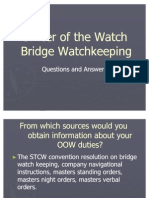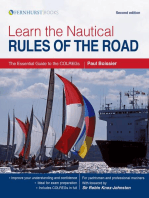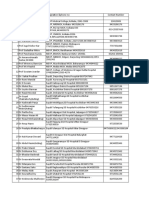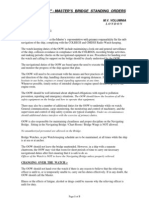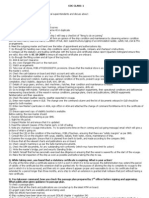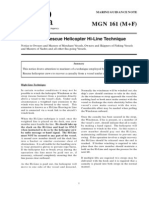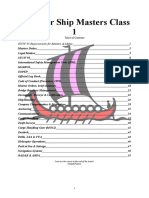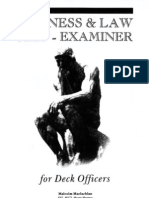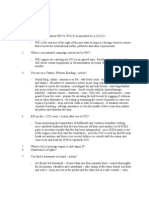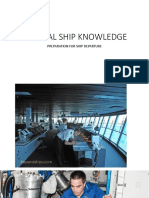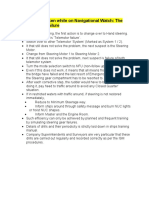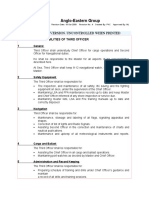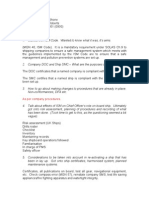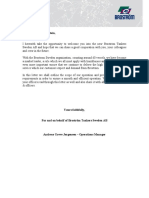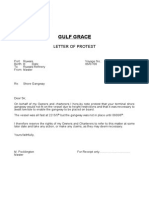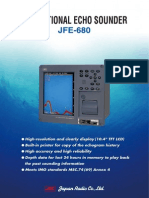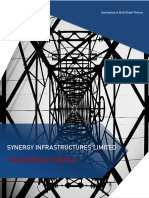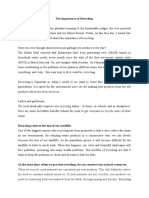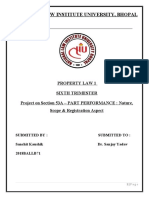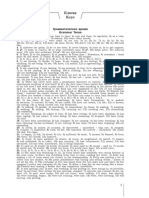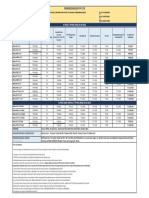Master Standing Order
Master Standing Order
Uploaded by
David DurhamCopyright:
Available Formats
Master Standing Order
Master Standing Order
Uploaded by
David DurhamCopyright
Available Formats
Share this document
Did you find this document useful?
Is this content inappropriate?
Copyright:
Available Formats
Master Standing Order
Master Standing Order
Uploaded by
David DurhamCopyright:
Available Formats
MASTER'S STANDING ORDERS OOW is responsible for the safe navigation of the Ship for the whole period
of his watch until such time as he has handed over his watch or, the Master has taken to command, and during that time he will remain on bridge. The OOW will be guided by the contents of international regulations and guidelines, but paying particular attention to the followings; THE SAFETY OF THE SHIP AND HER CREW ARE ALWAYS TO BE CONSIDERED PRIMARILY
1. The first and foremost duty of the OOW is the keeping of a GOOD LOOKOUT, using all means available, visual,
audible and electronic. 2. The International Regulations for Preventing Collisions at Sea are to be strictly observed. Do not hesitate to use whistle or engine in obeying these regulations. The maneuvering will be so clarity and in sufficient time to let any other vessel in no doubt as your intention when altering course 3. If you are in doubt to another vessel's intention, or if the bearing of any vessel on the port side is steady, call the Master, preferably when the range still exceeds five miles. 4. In reduced visibility immediately comply with international regulations. Do not hesitate to use whistle or engine if necessary. Commence plotting all targets, and inform the Master and Engine Control Room. For the purpose of these orders reduced visibility is anything less than three (3 ) miles. 5. All watch keeping officers have unlimited access to use main engine all the times. 6. The CPA should be maintained at least 2 NM whenever possible for overtaking/crossing vessels and fishing boats. 7. Only one chart at a time is to be on the chart table, this being the largest scale available for the area being navigated. Time spent in the chartroom is to be limited to essential navigational duties. 8. At sea, gyro and magnetic compasses are to be compared frequently and an azimuth bearing is to be taken after every major course alteration or at least once per watch. 9. All incoming radio or VHF warnings are to be drawn to the attention of the Master (navigational, weather forecasts, etc.) 10. Officers are to read the Company Regulations and carry out the duties prescribed therein. Officers are also to comply with all state regulations and to be conversant with all current 'M' Notices, Statutory Instruments and Coast Guard requirements. 11. UNDER PILOTAGE. An accurate record of the ship's passage (passing breakwaters, buoys etc.) is to be kept in the Log For Navigation In Confined Waters, together with details of all whistle signals and speed reductions whilst passing other vessels, mooring or shore installations. 12. AT ANCHORAGE. Use any or all of the navigational aids to monitor the vessel's position and the relative positions of other ships, shore transit bearing are to be used whenever possible as the quickest means of detecting a dragging anchor. 13. Most anchorages, however sheltered, can become untenable in a very short space of time in sudden bad weather. It is therefore of the utmost importance that at the first signs of deteriorating weather the main engine is put on immediate notice and the Master and Boatswain called. 14. IN PORT. For the whole period of his watch the OOW is responsible for the safety of the ship and cargo operation. He/she should ensure that; Gangways are fitted with properly rigged safety net, well lit. Moorings are to be checked regularly, especially in ports where swell surges are experienced. A stowaway search is to be carried out prior to departure. All officers are to sign these orders
Call Master in the following circumstances, but not limited: if restricted visibility is encountered or expected, if the traffic conditions or the movements of other ships are causing concern, if difficulty is experienced in maintaining course, on failure to sight land, a navigation mark or to obtain soundings by the expected time, if, unexpectedly, land or navigation mark is sighted or change in sounding occurs, on the breakaway of the engines, steering gear or any essential navigation equipment, in heavy weather if in any doubt about the possibility of weather damage, in any other emergency or situation in which he is in any doubt.
MASTER
Chief Officer
2nd Officer
3rd Officer
You might also like
- Master Standing Order For Ship's CaptainDocument3 pagesMaster Standing Order For Ship's CaptainCapt. Suzdayan87% (54)
- Part 20-Mstr Standing Order, Night OrderDocument4 pagesPart 20-Mstr Standing Order, Night Orderaungthein_san94% (31)
- Bridge Watch Keeping QuestionsDocument27 pagesBridge Watch Keeping QuestionsJohn O'Regan80% (5)
- OOW Oral NotesDocument185 pagesOOW Oral Notesgeorgesaguna100% (5)
- Collisions at Sea: Volume 1: Liability and the Collision RegulationsFrom EverandCollisions at Sea: Volume 1: Liability and the Collision RegulationsRating: 5 out of 5 stars5/5 (1)
- SyllabusDocument5 pagesSyllabusferkm25% (4)
- D-102 Chief Officer Standing Orders For Port WatchesDocument4 pagesD-102 Chief Officer Standing Orders For Port Watcheszainav100% (1)
- Master's Guide To Disciplinary ProceduresDocument17 pagesMaster's Guide To Disciplinary Proceduresmoe_htwe_1100% (2)
- Bridge Watch Keeping, Best PracticeDocument40 pagesBridge Watch Keeping, Best PracticeRafi Muiz100% (8)
- 007 - Navigational Assessment ChecklistDocument16 pages007 - Navigational Assessment ChecklistPrabowo100% (1)
- Singapore Coc-1 Master Oral PreparationDocument195 pagesSingapore Coc-1 Master Oral Preparationcaptainkhan1977100% (14)
- Call Centers in LahoreDocument16 pagesCall Centers in LahoreSajid Ali100% (1)
- Learn the Nautical Rules of the Road: The Essential Guide to the COLREGsFrom EverandLearn the Nautical Rules of the Road: The Essential Guide to the COLREGsNo ratings yet
- WB Authorised Mo For Amarnathji YatraDocument3 pagesWB Authorised Mo For Amarnathji YatraAnkit UjjwalNo ratings yet
- Standing OrderDocument3 pagesStanding OrderReza Zain100% (1)
- 2m Orals 2Document26 pages2m Orals 2Leena Pathak Juyal100% (1)
- Meteorology For OowDocument130 pagesMeteorology For OowChiazor KevinNo ratings yet
- Class 1, Masters Prep QuestionsDocument18 pagesClass 1, Masters Prep QuestionsJosefPsaila100% (2)
- Passage Plan (Master Point of ViewDocument1 pagePassage Plan (Master Point of ViewAung Htet Kyaw100% (2)
- Question Bank Orals Class 3Document2 pagesQuestion Bank Orals Class 3Mahen Fernando100% (2)
- 2013 Chief Mate OralsDocument39 pages2013 Chief Mate Oralssugumar100% (2)
- Standing Orders: Prepared by Captain Paul KeatingDocument10 pagesStanding Orders: Prepared by Captain Paul KeatingFritz Curt PeñalosaNo ratings yet
- Class 1 CoC Deck SingaporeDocument66 pagesClass 1 CoC Deck SingaporeImran Alam Satti100% (7)
- All Maritime Deck Oral NotesDocument100 pagesAll Maritime Deck Oral NotesAshish Sarkar85% (13)
- Errors in Oil Record Book Part I EntriesDocument3 pagesErrors in Oil Record Book Part I EntriesAbdul Anis100% (2)
- Master's Own Standing OrdersDocument4 pagesMaster's Own Standing OrdersCelal Bozdogan100% (2)
- Master's Bridge Standing Orders - VolumniaDocument5 pagesMaster's Bridge Standing Orders - VolumniaAnil Kumar Vyas100% (3)
- Bridge Standing OrdersDocument8 pagesBridge Standing OrdersRobert Peel100% (2)
- Master Standing Order GuidelinesDocument11 pagesMaster Standing Order GuidelinesImroz AhmedNo ratings yet
- Master's Night OrdersDocument4 pagesMaster's Night OrdersDaniel Mocanu100% (6)
- Sanga - Class 1Document21 pagesSanga - Class 1Akanksha Gairola Agrawal50% (4)
- MGN 161 - Hi Line TechniqueDocument2 pagesMGN 161 - Hi Line TechniqueBrian Sinnott100% (1)
- Masters Standing OrdersDocument13 pagesMasters Standing OrdersKunal Ujjainkar100% (1)
- Mates Orals StuffDocument67 pagesMates Orals Stuffnishadyadav100% (8)
- Master Study NotesDocument52 pagesMaster Study NotesThomas Edward Smith100% (1)
- Business & Law Self Examiner For Deck OfficersDocument190 pagesBusiness & Law Self Examiner For Deck OfficersYasir Saeed Khan100% (5)
- Master Oral June 2015 ALEC KEEPDocument3 pagesMaster Oral June 2015 ALEC KEEPanil0% (1)
- Asm Questions With Answers For Dec'10 Month Version 1Document32 pagesAsm Questions With Answers For Dec'10 Month Version 1Chetan Likhite100% (2)
- GL Checklist For Maintenance of Safety Equipment Tcm4-590999Document21 pagesGL Checklist For Maintenance of Safety Equipment Tcm4-590999Eyoma EtimNo ratings yet
- Captain Harun - MASTER ORALS Answers - Docx-1Document22 pagesCaptain Harun - MASTER ORALS Answers - Docx-1yousudz100% (6)
- 2 Mates OralsDocument52 pages2 Mates OralsNarayana Reddy100% (3)
- Delegation 3rd OfficerDocument1 pageDelegation 3rd Officerlola100% (2)
- Vetting Check ListDocument13 pagesVetting Check ListharrdyNo ratings yet
- General Ship Knowledge - Preparation For PDFDocument26 pagesGeneral Ship Knowledge - Preparation For PDFAN IYERNo ratings yet
- Part 26-Certs & SurveysDocument23 pagesPart 26-Certs & Surveysaungthein_san75% (4)
- Bridge WatchKeeping EmergenciesDocument15 pagesBridge WatchKeeping EmergenciesBehendu PereraNo ratings yet
- Navigation SQADocument13 pagesNavigation SQACherian KuttyNo ratings yet
- BPG Mandy PDFDocument8 pagesBPG Mandy PDFMandy ConquersNo ratings yet
- When Your Ship Is Dragging AnchorDocument9 pagesWhen Your Ship Is Dragging AnchorGAMMA FACULTY100% (1)
- Questions Oral Brevet OowDocument51 pagesQuestions Oral Brevet OowvincnetNo ratings yet
- Mates Masters Orals Handbook 27 Nov 2019Document130 pagesMates Masters Orals Handbook 27 Nov 2019cicileana100% (2)
- 04.01.2021 - Enclosed Space RescueDocument5 pages04.01.2021 - Enclosed Space RescueAlikar Arslan100% (1)
- Welcome On Board. Hope These Notes Will Help You in Settling Down During Your Stay On Board.'Document8 pagesWelcome On Board. Hope These Notes Will Help You in Settling Down During Your Stay On Board.'gidjuns abs100% (1)
- Passage Planning SummaryDocument5 pagesPassage Planning Summarythugsdei100% (2)
- Oow Oral General Stuff Quick ReckonerDocument36 pagesOow Oral General Stuff Quick ReckonerUtkarsh Mane100% (8)
- Responsibilities of Third Officer PDFDocument2 pagesResponsibilities of Third Officer PDFFrankrisna Kusuma Hendra100% (1)
- Knowledge of 3rd OfficerDocument9 pagesKnowledge of 3rd OfficerVũ Hoàng Duy Nguyễn100% (1)
- Orals Past PapersDocument34 pagesOrals Past PapersHoward Markham100% (1)
- Chief Mate Q&ADocument27 pagesChief Mate Q&Arigel100% (5)
- OOW ORAL Flash Card NotesDocument98 pagesOOW ORAL Flash Card NotesTyrone Sharp100% (6)
- Interview Question - Master, C.O, 2.O, 3.ODocument6 pagesInterview Question - Master, C.O, 2.O, 3.OVandinh Dong100% (1)
- Oral Preparation Watch Keeper Deck Mates: Question and Answer GuidelinesFrom EverandOral Preparation Watch Keeper Deck Mates: Question and Answer GuidelinesRating: 5 out of 5 stars5/5 (1)
- Navigation LightsDocument2 pagesNavigation LightsDavid DurhamNo ratings yet
- Enclosed Spaces Guidance For Merchant Vessel OperatorsDocument12 pagesEnclosed Spaces Guidance For Merchant Vessel OperatorsDavid DurhamNo ratings yet
- Secured For Sea or NotDocument2 pagesSecured For Sea or NotDavid DurhamNo ratings yet
- Benetton-Jonathan MantleDocument120 pagesBenetton-Jonathan MantleDinica VickyNo ratings yet
- Tank YıkamaDocument59 pagesTank YıkamaDavid DurhamNo ratings yet
- Order LetterDocument44 pagesOrder LetterDavid Durham100% (1)
- 2001 A Space OdysseyDocument216 pages2001 A Space OdysseyNihad Hasanović100% (2)
- NOP52 Shore GangwayDocument1 pageNOP52 Shore GangwayDavid DurhamNo ratings yet
- LopDocument2 pagesLopDavid DurhamNo ratings yet
- Jfe 680 PDFDocument2 pagesJfe 680 PDFDavid DurhamNo ratings yet
- Lifetime CalenderDocument1 pageLifetime CalenderDavid DurhamNo ratings yet
- What Is h2sDocument1 pageWhat Is h2sDavid DurhamNo ratings yet
- Company Profile 2021Document26 pagesCompany Profile 2021Sharad DangeNo ratings yet
- The General Provident Fund (Central Service) Rules, 1960Document40 pagesThe General Provident Fund (Central Service) Rules, 1960Maddela Ravi kumarNo ratings yet
- SJ 2020 0141comm.v.utley MemorandumofDecisionandJudgmentDocument5 pagesSJ 2020 0141comm.v.utley MemorandumofDecisionandJudgmentAndrew MartinezNo ratings yet
- NJ Bookkeeper and Accountant Civil Service ExaminationDocument123 pagesNJ Bookkeeper and Accountant Civil Service Examinationk10924No ratings yet
- PR Tech Assignment 2 Online Newsletter 1Document3 pagesPR Tech Assignment 2 Online Newsletter 1api-297320329No ratings yet
- JN SoDocument85 pagesJN SoTariku LegesseNo ratings yet
- PovertyDocument4 pagesPovertyprahalladadas20No ratings yet
- Delegation Agreement (Example)Document3 pagesDelegation Agreement (Example)Audrey HuffNo ratings yet
- Sociology of Arts & HumanitiesDocument3 pagesSociology of Arts & Humanitiesgayle gallazaNo ratings yet
- CP4 PDFDocument6 pagesCP4 PDFLeona Mae Dela CruzNo ratings yet
- The Itinerary of Rabbi Benjamin of Tudela. v.2Document476 pagesThe Itinerary of Rabbi Benjamin of Tudela. v.2Leigh SmithNo ratings yet
- Form14A Singapore Visa Application FormDocument3 pagesForm14A Singapore Visa Application FormAbhishëk SaxënaNo ratings yet
- The 1997 Rules of Civil Procedure 2002 Edition: Jurisdiction in GeneralDocument11 pagesThe 1997 Rules of Civil Procedure 2002 Edition: Jurisdiction in GeneralbubblingbrookNo ratings yet
- Chapter 6 Perception and Individual Decision Making 65Document19 pagesChapter 6 Perception and Individual Decision Making 65Kucing HitamNo ratings yet
- Importance of RecyclingDocument2 pagesImportance of RecyclingMazwani Wahi Anuar100% (1)
- Complete Solutions For Your Success in WeavingDocument24 pagesComplete Solutions For Your Success in WeavingSmita PatilNo ratings yet
- Portal - Fbise.edu - PK Fbise-Conduct Result Result-link-ssc2.Php RollNo 1054272&name MUHAMMAD SUDAIS&Annual SSC-IIDocument1 pagePortal - Fbise.edu - PK Fbise-Conduct Result Result-link-ssc2.Php RollNo 1054272&name MUHAMMAD SUDAIS&Annual SSC-IIPTV SportsNo ratings yet
- Property Law 1Document23 pagesProperty Law 1SanchitNo ratings yet
- Developing A Powerful Sales PersonalityDocument15 pagesDeveloping A Powerful Sales PersonalityAlyssa kyle FranciaNo ratings yet
- Navaja vs. de CastroDocument16 pagesNavaja vs. de Castrojayinthelongrun50% (2)
- Starlight 11 Sbornik Gram Upr KLYuChIDocument4 pagesStarlight 11 Sbornik Gram Upr KLYuChIevgeniapopova1000000No ratings yet
- Kashmir Pen Issue 15 Vol 9Document16 pagesKashmir Pen Issue 15 Vol 9Rouf Ahmed NajarNo ratings yet
- Rishabh Shetty CVDocument6 pagesRishabh Shetty CVanandchandrasekhar09No ratings yet
- Name: DIZON, Maria Rowela Rose L. Section: BSLM - 1C I. EssayDocument3 pagesName: DIZON, Maria Rowela Rose L. Section: BSLM - 1C I. EssayRowela Rose DizonNo ratings yet
- Dr. MCR HRD Institute of A.P., Hyd: Information Hand Book (Under The Rti Act 2005)Document29 pagesDr. MCR HRD Institute of A.P., Hyd: Information Hand Book (Under The Rti Act 2005)penusilaNo ratings yet
- HLPE 2020 ReportDocument112 pagesHLPE 2020 ReportRania Touma WannaNo ratings yet
- Vendor List - MainDocument12 pagesVendor List - MainAyanna SalmanNo ratings yet
- Tata Altroz PetrolDocument1 pageTata Altroz PetrolArka DasNo ratings yet


